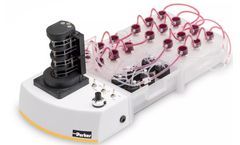- Home
- Applications
- physiological relevance
Refine by
Physiological Relevance Product Applications
6 applications found
Using 3D bioprinters can create physiologically-relevant cellular disease models to test therapeutic hypothesis by accurately and reproducibly controlling the deposition of different cell types and support materials, providing a viable technology solution for drug discovery projects. ...
ByRegenhu based in Villaz-St-Pierre, SWITZERLAND
These tools can interrogate large numbers of mutations in cell surface receptors and many globular proteins, offering a unique path forward for protein optimization based on high quality, physiologically-relevant data in eukaryotic or – specifically – human ...
ByCyrus Biotechnology Inc. based in Seattle, WASHINGTON (USA)
With Quasi Vivo, Kirkstall’s flow system, you can quickly and easily set up and run in vitro assays to detect hepatotoxicity of novel compounds. ...
ByKirkstall Ltd. based in York, UNITED KINGDOM
Facilitate the construction of human skin equivalents for wound healing research, cosmetic product development or drug delivery ...
ByRegenhu based in Villaz-St-Pierre, SWITZERLAND
Increase clinical translation with Organ-Chips for ADME-Tox assessments. Accurate ADME-Tox profiling of preclinical drug candidates remains a challenge. Preclinical ADME-Tox (Absorption, Distribution, Metabolism, Excretion, and Toxicity) studies are pivotal to predicting human response. However, approximately 30% of drugs fail during human clinical trials due to adverse reactions despite promising preclinical study results, and another 60% fail due to lack of efficacy. As companies broaden the modality toolbox ...
ByEmulate based in Boston, MASSACHUSETTS (USA)
Kirkstall’s Quasi Vivo® system aims to establish and optimise a human in vitro 3D Blood Brain Barrier (BBB) in an effort to identify important mechanistic pathways for successful biomarker analysis, drug delivery and toxicity ...
ByKirkstall Ltd. based in York, UNITED KINGDOM





